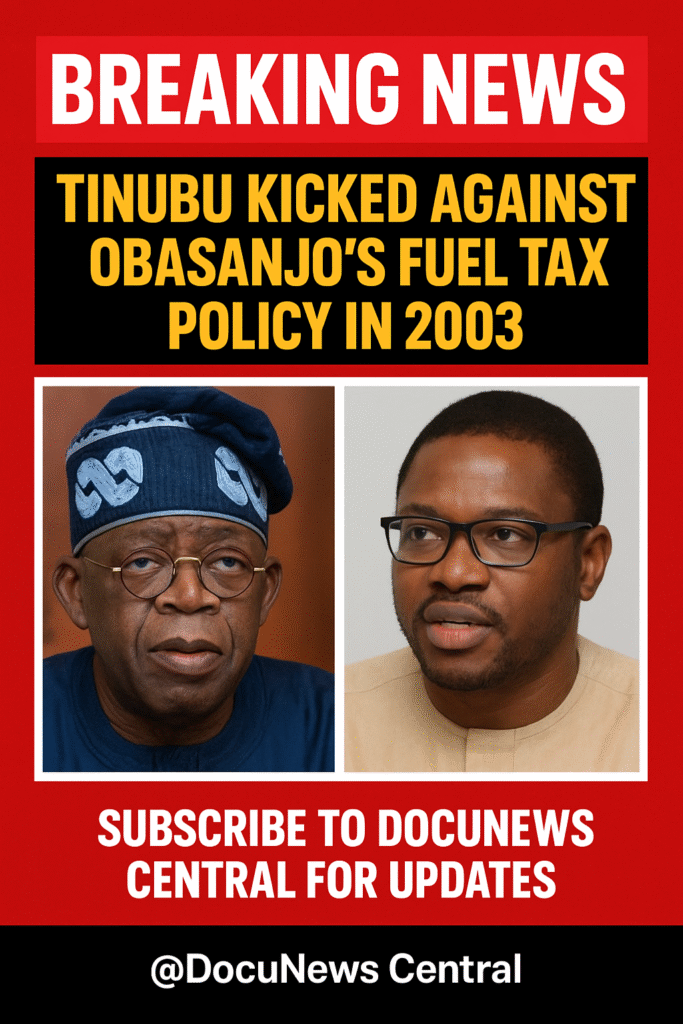
BREAKING NEWS: Tinubu Once Fought Fuel Tax Under Obasanjo, Now Introduces It As President
A Shocking Turn of Events
President Bola Ahmed Tinubu has stirred strong reactions after signing into law a new fuel surcharge in Nigeria. The policy adds a 5% tax on petrol, diesel, aviation fuel, and other refined products. Nigerians are asking why Tinubu, who once fought against a similar tax under former President Olusegun Obasanjo in 2003, is now the one pushing it.
✅ Subscribe to DocuNews Central for Breaking Updates – Get the latest verified news delivered to you daily. Follow us on Facebook: DocuNews Central
Flashback to 2003: Tinubu vs. Obasanjo
In 2003, Bola Tinubu was the governor of Lagos State. At that time, Obasanjo’s administration introduced a fuel tax plan. Tinubu was one of the loudest voices against it. He called it double taxation. He said it would make life harder for Nigerians. He even threatened to challenge the tax in court. His position was clear: the fuel tax was unfair and unnecessary.
Rufai Oseni Raises the Alarm
The issue came back to light when journalist Rufai Oseni reminded Nigerians of Tinubu’s past words. In a post that went viral, Oseni noted the irony. He said: “The same Tinubu who vowed to challenge Obasanjo’s fuel tax is now the one giving us a new fuel tax.” Many Nigerians agreed with him. Social media has been flooded with sharp comments, videos, and memes highlighting the U-turn.
📢 Join the Conversation – Share your thoughts on our Facebook page: DocuNews Central
The New Fuel Surcharge Explained
The new surcharge places a 5% levy on all refined petroleum products. This means petrol, diesel, and aviation fuel will all cost more. Products like kerosene, cooking gas, and compressed natural gas (CNG) are not included. The government says the money will go into clean energy projects and transport infrastructure. But many citizens are not convinced.
Price Impact on Nigerians
The reality on the ground is tough. Fuel already costs about ₦950 per litre in many states. The new 5% levy adds another ₦45 to the price. Transport fares are likely to rise. Traders are expected to pass the extra cost to buyers. Families struggling to pay for food, school fees, and rent now face another burden.
Why Tinubu Opposed It Then
Back in 2003, Tinubu said fuel tax would amount to punishing the people. He called it insensitive. He told the federal government that it was illegal to impose such a levy without the consent of Nigerians. He also claimed Lagosians, who already paid so much in taxes, would suffer the most. His voice was firm, and his words echoed across the country. read also Court Rejects Nnamdi Kanu’s Request for Transfer from Sokoto at docunewscentral.com
Why Tinubu Supports It Now
The Tinubu government has a different message today. Officials say the surcharge is needed to fund alternative energy projects. They argue it will reduce Nigeria’s heavy reliance on petrol. They also say it will help raise funds for new roads, railways, and other infrastructure. To them, the levy is not punishment but progress.
Nigerians Feel Betrayed
Many Nigerians see it differently. For them, this is another broken promise. Tinubu had positioned himself in 2003 as the defender of the people. Now, he is the one introducing a tax he once condemned. Critics say this shows double standards. Some call it hypocrisy. Others say it is proof that Nigerian leaders care more about revenue than the welfare of citizens.
⚡ Stay Connected – Follow DocuNews Central on Facebook for updates on this developing story.
Rising Anger Across the Nation
Reactions have been swift. In markets and bus stops, people are talking about it. On radio and television shows, callers express shock. Online, hashtags attacking the new policy are trending. Nigerians remember Tinubu’s old speeches, and they are sharing them widely. The contrast between then and now is fueling anger.
Economic Experts Weigh In
Economists have mixed views. Some say the surcharge is not bad if the funds are used well. They argue that Nigeria must invest in clean energy. They say fuel subsidies and heavy oil use are hurting the economy. But other experts warn that the timing is wrong. They note that Nigerians are still facing high inflation, low wages, and a weak naira. Adding more tax, they say, will push millions deeper into poverty.
Transport Workers React
Transport unions are already warning of fare hikes. Bus drivers say they cannot absorb the new cost. Airlines are hinting at ticket increases. Logistics companies say delivery fees will rise. The chain effect will touch every Nigerian, from urban workers to rural farmers.
Memories of Past Protests
Nigerians still remember the nationwide strikes that greeted fuel price hikes in the past. In 2012, massive protests shook the country when the government tried to remove fuel subsidy. In those protests, Tinubu’s political allies stood with the people against Jonathan’s government. Now, observers are asking if the same leaders will back the people again.
Civil Society Speaks Out
Several rights groups have condemned the new surcharge. They say it violates the trust of the people. They accuse the government of worsening the suffering of ordinary Nigerians. Some are calling for peaceful protests. Others are pushing for legal action to challenge the policy, just as Tinubu once promised to do against Obasanjo. also read more on legit.com
The International Angle
Global bodies are watching too. The World Bank and IMF have often advised Nigeria to find new ways of raising revenue. Some believe this tax was encouraged by such advice. But the same groups also warn against harsh policies that hurt the poor. International investors are also tracking the reaction of Nigerians. Social unrest could affect investment decisions.
Political Rivals Attack
Opposition parties are wasting no time. They are using Tinubu’s old words against him. Spokesmen from different parties say Tinubu has betrayed his own principles. They claim this is proof that the ruling party only cares about power, not the people. Some are even digging up video clips of Tinubu’s 2003 speeches to remind Nigerians of his earlier stance.
Supporters Defend Tinubu
On the other hand, loyalists are defending the president. They say times have changed. They argue that Nigeria’s energy needs in 2025 are very different from 2003. They also point to climate change, global fuel prices, and the need for modern infrastructure. According to them, Tinubu is making a tough but necessary choice.
The Legal Question
Lawyers are beginning to debate the legality of the surcharge. Can the federal government impose such a tax without fresh approval from the National Assembly? Some legal experts say yes. Others say no. The matter may soon end up in court, just as Tinubu once suggested back in 2003.
Public Trust at Stake
Beyond the law, the bigger issue is trust. Nigerians have long felt betrayed by politicians who say one thing and do another. For many, Tinubu’s new policy proves that leaders cannot be trusted. This feeling may deepen political apathy. It could also spark unrest if not managed.
The Road Ahead
What happens next depends on how the government handles the backlash. If the funds raised are used transparently, some Nigerians may accept it. But if corruption swallows the revenue, anger will rise. If the surcharge leads to visible projects, the government may earn back trust. If not, it could become another scar in Nigeria’s history of failed policies.
🚨 Breaking News Alerts – Don’t miss updates. Like and follow DocuNews Central today.
History Repeats Itself
In 2003, Tinubu stood with Nigerians against fuel tax. In 2025, he has introduced it himself. History has come full circle, but in reverse. Nigerians are now left to wonder: was Tinubu right then, or is he right now?
Conclusion
This is more than a tax. It is a test of leadership. It is a test of memory. Nigerians remember what Tinubu once said. They see what he is doing today. The verdict will not only shape his presidency but also the trust Nigerians place in their leaders. For now, the nation waits to see how this storm will play out.
Stay Updated
Follow DocuNews Central on Facebook for the latest verified updates, breaking stories, and in-depth analysis.









